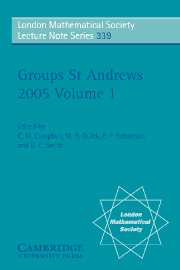Book contents
- Frontmatter
- Contents
- Introduction
- Aspects of infinite permutation groups
- Self-similarity and branching in group theory
- On surface groups: motivating examples in combinatorial group theory
- Nilpotent p-algebras and factorized p-groups
- Classification of finite groups by the number of element centralizers
- Algorithmic use of the Mal'cev correspondence
- Minimal but inefficient presentations for semi-direct products of finite cyclic monoids
- The modular isomorphism problem for finite p-groups with a cyclic subgroup of index p2
- On one-generated formations
- New results on products of finite groups
- Radical locally finite T-groups
- Explicit tilting complexes for the Broué conjecture on 3-blocks
- Conjugacy classes of p-regular elements in p-solvable groups
- An algorithm for the unit group of the Burnside ring of a finite group
- Integral group ring of the first Mathieu simple group
- Embedding properties in direct products
- Malcev presentations for subsemigroups of groups — a survey
- Finite groups with extremal conditions on sizes of conjugacy classes and on degrees of irreducible characters
- Conjugacy class structure in simple algebraic groups
- On automorphisms of products of groups
- Linear groups with infinite central dimension
- G-automata, counter languages and the Chomsky hierarchy
- An embedding theorem for groups universally equivalent to free nilpotent groups
- Irreducible word problems in groups
- Recent growth results
Algorithmic use of the Mal'cev correspondence
Published online by Cambridge University Press: 07 May 2010
- Frontmatter
- Contents
- Introduction
- Aspects of infinite permutation groups
- Self-similarity and branching in group theory
- On surface groups: motivating examples in combinatorial group theory
- Nilpotent p-algebras and factorized p-groups
- Classification of finite groups by the number of element centralizers
- Algorithmic use of the Mal'cev correspondence
- Minimal but inefficient presentations for semi-direct products of finite cyclic monoids
- The modular isomorphism problem for finite p-groups with a cyclic subgroup of index p2
- On one-generated formations
- New results on products of finite groups
- Radical locally finite T-groups
- Explicit tilting complexes for the Broué conjecture on 3-blocks
- Conjugacy classes of p-regular elements in p-solvable groups
- An algorithm for the unit group of the Burnside ring of a finite group
- Integral group ring of the first Mathieu simple group
- Embedding properties in direct products
- Malcev presentations for subsemigroups of groups — a survey
- Finite groups with extremal conditions on sizes of conjugacy classes and on degrees of irreducible characters
- Conjugacy class structure in simple algebraic groups
- On automorphisms of products of groups
- Linear groups with infinite central dimension
- G-automata, counter languages and the Chomsky hierarchy
- An embedding theorem for groups universally equivalent to free nilpotent groups
- Irreducible word problems in groups
- Recent growth results
Summary
Abstract
Mal'cev showed in the 1950s that there is a correspondence between radicable torsion-free nilpotent groups and rational nilpotent Lie algebras. In this paper we show how to establish the connection between the radicable hull of a finitely generated torsion-free nilpotent group and its corresponding Lie algebra algorithmically. We apply it to fast multiplication of elements of polycyclically presented groups.
Introduction
The connection between groups and Lie rings, respectively Lie algebras, is a wellknown and mathematically very useful concept. For example, a typical way to solve a problem in a Lie group is to transfer the problem to the Lie algebra of the group, study it there with the help of tools from linear algebra and transfer the result back into the Lie group.
Mechanisms of this kind have also been shown to be useful for algorithmic applications. For instance, Vaughan-Lee and O'Brien used Lie ring techniques to construct a consistent polycyclic presentation of R (2, 7), the largest 2-generator group of exponent 7 [16].
In this paper we demonstrate the algorithmic usefulness of the Mal'cev correspondence between torsion-free radicable nilpotent groups and rational nilpotent Lie algebras. We use it to develop an algorithm for fast multiplication in polycyclic groups. To be more precise, for a infinite polycyclic group G, given by a polycyclic presentation, we show how to determine a subgroup H of finite index in G, and construct an algorithm which carries out fast multiplication in H.
Information
- Type
- Chapter
- Information
- Groups St Andrews 2005 , pp. 158 - 169Publisher: Cambridge University PressPrint publication year: 2007
